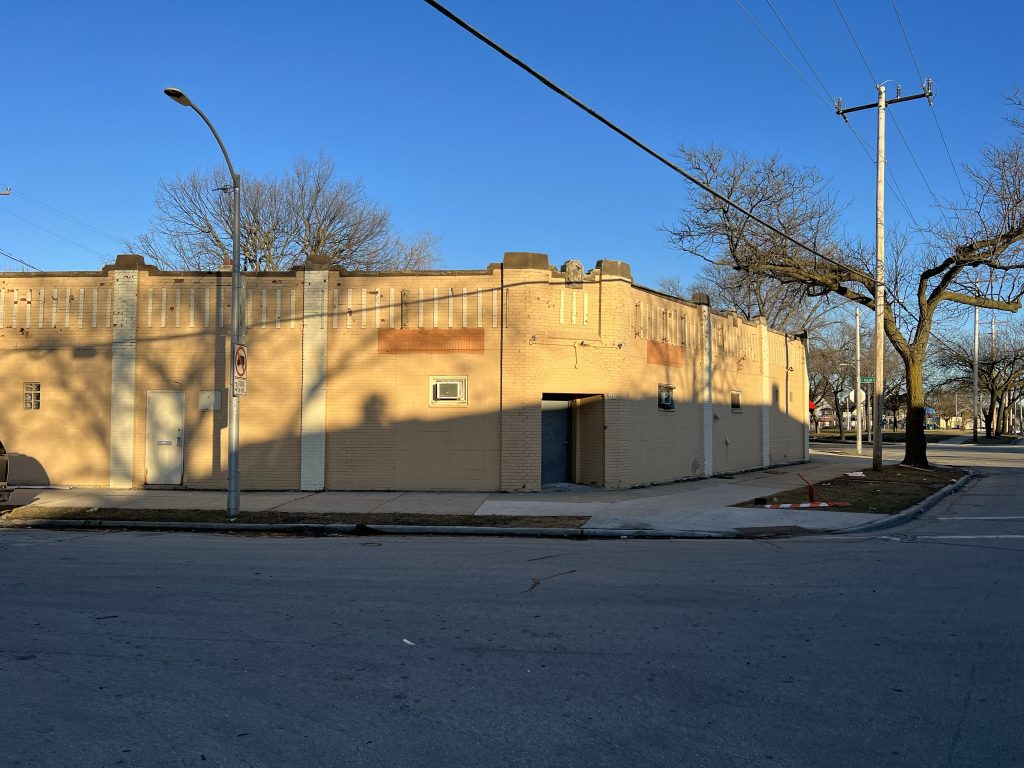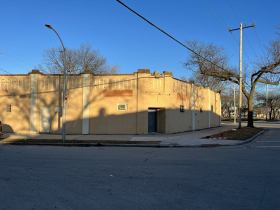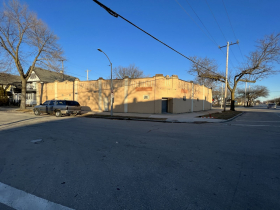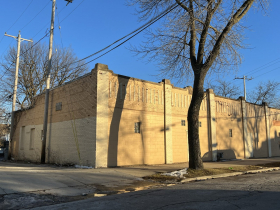Former Atkinson Ave. Church for Sale
Building was launch pad for two highly-regarded actors. Plus: A recap of week's real estate news.
The City of Milwaukee is looking for a new owner to breathe life back into a one-story, 5,076-square-foot commercial building most recently used as a church.
Located just off Interstate 43, the building fills the northeast corner of the five-pointed intersection of W. Atkinson Ave., N. 11th St. and W. Nash St. It’s addressed as 1036 W. Atkinson Ave., though it used to have several storefronts facing W. Atkinson Ave. and N. 11th St.
It’s likely best known for its use as a church.
Starting in the early 1970s, it housed C.H. McClelland‘s Eagle Eye Church of God in Christ, which relocated west and took on the name Holy Cathedral Church of God in Christ in 1989. The Atkinson Ave. building then became home to Heritage Memorial Church of God in Christ for many years, until the city took possession of it through property tax foreclosure in 2019.
Reverend Nathaniel J. Stampley led the church, known in state records as Heritage International Ministries Church of God in Christ. Two of his children, Malkia Stampley and Nathaniel Stampley, are highly-regarded actors and have credited their time in the church as part of their development. Malkia is known locally as a stage actress and director as well as for television roles (including “The Chi”, “Empire, “61st Street” and “Shameless”). Nathaniel is a highly-regarded theater actor who has performed in five Broadway shows, including as Mufasa in “The Lion King.” In addition to his role as pastor, the elder Stampley represented the surrounding neighborhood on the Milwaukee County Board of Supervisors from 1992 to 1996. He did not seek re-election.
The Department of City Development (DCD) is asking $25,000 for the property.
A buyer must restore the storefront windows facing W. Atkinson Ave., which permit records show as closed off since the 1970s. As is standard on city property sales, DCD will not sell the property for use as a “parking lot, pawn shop, cigarette or cigar shop, gun shop, liquor store, payday or auto-title loan store, medical service facility, day care, childcare, adult daycare, or other uses prohibited by zoning.”
Two blocks west, another former church is likely available. In May 2020, a city-owned, boarded-up building at 1228-1232 W. Atkinson Ave. collapsed onto the Holy Recovery International Church building to the north at 1238 W. Atkinson Ave. The city paid $50,000 to settle a legal claim. The church still stands in a dilapidated state.
The building is located in the city’s Arlington Heights neighborhood. The listing sheet is available on the DCD website.
Photos
Weekly Recap
State’s Housing Shortage Worse for Marginalized Groups
While Wisconsin’s housing shortage has posed major hurdles for renters and prospective homebuyers, it’s been especially difficult for the state’s marginalized communities.The state needs to build at least 140,000 housing units by the end of the decade to keep pace with current demand, and that number jumps to 227,000 units if Wisconsin hopes to grow its working-age population, according to a report by Forward Analytics, the research arm of the Wisconsin Counties Association.
As a result of the shortage, African Americans, immigrants, refugees, young members of the LGBTQ+ community and domestic violence victims have struggled to find quality affordable housing, according to a new report from Green Bay’s Equal Rights Commission.
“We serve so many clients every day at our agency — from domestic violence, to sexual assault to youth programming — and the No. 1 disparity that exists right now in our community is sadly housing,” said Robin Scott, executive director of We All Rise African American Resource Center, at a Green Bay Common Council meeting last Tuesday.
Downtown Ramada Being Deconstructed, Recycled
The former Ramada hotel in downtown Milwaukee will soon be no more. But instead of taking a wrecking ball to it, Recyclean is deconstructing the building, 633 W. Michigan St., with a focus on saving as many materials for resale or recycling as possible.Its environmentally-friendly removal is one of the first visible signs of the proposed Iron District, an 11-acre, mixed-use development that would include a stadium, concert hall, hotel, apartments and other uses.
The seven-story, 155-room hotel opened in 1967 in the southwestern corner of Downtown, but was shuttered in 2018. It spent the last year of its life as the unaffiliated “City Center Hotel Milwaukee.” Marquette University acquired the property in 2015 as part of a since-aborted plan to develop a health, wellness and athletics facility on the larger site.
The hotel, according to a 1965 Milwaukee Journal article, had a $2.2 million development cost. The underlying property sold for virtually that same amount in June, with an affiliate of Kenosha-based Bear Development paying $2.25 million for the 1.84-acre property as part of a series of transactions to buy the Iron District site from Marquette. A raze permit says Bear is now paying Recyclean, another Kenosha firm, $20,000 to remove the structure. Marquette paid an Oconomowoc investment group $3.8 million for the property.
Developer Buys Site For East Side Tower
The developer behind a proposed 25-story, easts-side apartment tower purchased the site, even before the city hosts a formal public hearing on a zoning change to enable the project.
An affiliate of New Land Enterprises, Renaissance MKE LLC, paid $3.4 million for the shuttered Renaissance Place event center at 1451 N. Prospect Ave. and the adjacent Mexican Consulate, 1443 N. Prospect Ave. according to state real estate records.
The 310-unit apartment building is proposed to be developed facing N. Farwell Ave. atop a rear parking lot long used by the venue and the consulate.
Designed by Korb + Associates Architects, the new tower would leverage its density to support a number of amenities. A rooftop terrace and pool are proposed, as are an indoor-outdoor club room, fitness center, golf simulator, coworking space, pet grooming center, car wash station and secured bicycle storage room.
Wisconsin Supreme Court Rules Against ‘Dark Store Loophole’
The Wisconsin Supreme Court sided with the City of Delavan on Thursday, deciding that its property tax assessments of a Lowe’s Home Improvement store were correct after the store had sued in an attempt to get a lower assessment, and therefore pay less property tax.
The decision strikes a blow to the use of so-called “dark store” tax theory that has become common in Wisconsin and across the country. The method involves comparing the value of an operating big box retail store to long vacant, or “dark,” stores nearby. Pushed by big box retailers such as Lowe’s, Menards and Walmart — with the support of Wisconsin Manufacturers and Commerce, the state’s largest business lobby — dark store theory has been criticized by local officials and the public because it can take revenue away from municipalities and cause the property taxes on residents’ homes to increase.
“Property taxes for homeowners and main street businesses are increasing in Wisconsin as national retailers pay less,” the League of Wisconsin Municipalities wrote in a 2017 document. “A carefully-orchestrated wave of 100s of lawsuits in Wisconsin is forcing assessors to slash the market value of thriving national retail stores, shifting their tax burden to local mom and pop shops and to their home-owning customers.”
The dark store theory has drawn significant coverage in the national news media as local officials warn of what could happen to municipality’s ability to provide services such as police and fire, public schools and road maintenance if big box stores, that were lured to these towns because of the promise of jobs and effect on the local economy, are able to decrease their tax bills using this method.
City Board Endorses $30 Million For NM’s $500 Million Tower Project
Northwestern Mutual‘s proposal to completely overhaul its 18-story North Building into a smaller version of its 2017 office tower received its first public endorsement Thursday afternoon. The company would shutter its suburban Franklin campus as part of the agreement, creating a downtown campus with at least 5,750 employees.
The city is to provide $30 million to the insurance company in exchange for it redeveloping the tower, 818 E. Mason St., with a glassy facade and modern interior and growing its employee base. The city will also dedicate $10 million of increased tax revenue from the development towards public infrastructure improvements, including new protected bike lanes, redesigning a major intersection and improving Cathedral Square Park and Juneau Park.
It’s part of a snowball effect that was set in motion in December 2012, when the company publicly unveiled plans to develop the 32-story, $450 million Northwestern Mutual Tower and Commons.
“We are happy to report 10 years later, by almost any measure, we think that project exceeded expectations,” said Steve Radke, head of the insurance company’s government relations team and foundation to the Redevelopment Authority of the City of Milwaukee. That includes a shift in attitude towards Downtown, creating jobs for more than 800 city residents through the tower’s construction, developing the unsubsidized 7Seventy7 apartment tower and parking structure, the company outperforming employment benchmarks to earn the initial $54 million subsidy and the complex being assessed at greater than expected values, shortening the payback period.
Cargo Hub Planned For Milwaukee Airport
A former U.S. Air Force Reserve base on the edge of Milwaukee Mitchell International Airport is to be replaced by an air cargo facility.
Known as the South Cargo Logistics Hub, the 288,000-square-foot facility would have direct access to the airport tarmac. It’s being positioned as a state-of-the-art shipping center that would avoid higher costs and congestion associated with shipping through O’Hare International Airport in Chicago.
The facility would be developed at the site of the General Mitchell Air Reserve Station, long home to the 440th Airlift Wing. The U.S. Air Force closed the station in 2008 after approximately 60 years of use. The 102-acre property was transferred to Milwaukee County ownership in 2010.
The proposal is being developed by Dallas-based Crow Holdings and marketed by CBRE brokers David Prell and Scott Furmanski.
New Program Targets Home Appraisal Bias
Following a national outcry over discrimination in housing appraisals, the Metropolitan Milwaukee Fair Housing Council has created a program to help those who may be facing such a hurdle.
The education outreach campaign provides information surrounding housing discrimination to those who feel they may be discriminated against and helps them find a legal remedy if needed.
“This has been on our radar a long time but became a more complex issue when it became a federal problem,” said Erika Sanders, the director of program services for the council.
At the beginning of 2022, a conversation about appraisal discrimination started after a judge found it plausible that race discrimination occurred in a Black couple’s lawsuit over a lowball appraisal in Maryland.
Shoreline Acquires The Cudahy Tower
The Cudahy Tower, a 15-story apartment building overlooking Lake Michigan, is no longer owned by a member of the Cudahy family. The building, 925 E. Wells St., was sold by the family’s foundation to the owners of Shoreline Real Estate, the Crichton family.
“The Cudahy Foundation is pleased to announce the sale of the Cudahy Tower Apartments to the Crichton family, owners of Shoreline Real Estate. The Crichtons are honored to continue the legacy of the late Michael Cudahy and his daughter Julie, providing the same level of care for the property and first-class experience for its residents,” said both families in a joint statement.
Michael Cudahy passed away in March 2022 at the age of 97. He was a philanthropist, civic leader and the founder of Marquette Electronics (later sold to GE). He redeveloped the complex, which his grandfather and father built, starting in the 1980s.
The property contains 80 apartments according to city assessment records. Bacchus, operated by The Bartolotta Restaurants, is located on the first floor. The building website says there are currently no vacancies.
Third Ward Tavern Would Be Replaced By 2-Story Building
The development team that would like to demolish one of the oldest buildings in the Historic Third Ward made its case to the neighborhood’s architectural review board Wednesday.
General Capital Group and Joseph Property Development are pursuing the demolition of the historically-protected, triangular tavern building at 266-272 E. Erie St. Acquired in 2014, after it was damaged in a fire, the firms initially pursued the restoration of the structure.
“We are save first. If we could, we would,” said Joseph Property vice president Nathan Bernstein to Urban Milwaukee.
Architect Chris Socha, partner at The Kubala Washatko Architects, made the case to the architectural review board. All three firms have undertaken several historic preservation projects in the city.
Ambassador Now A Wyndham Trademark Hotel
The Ambassador Hotel is now part of Wyndham Hotels & Resorts’ “Trademark Collection.”
The hotel, which continues to be independently owned by Rick Wiegand, will now be marketed through Wyndham’s website and participate in the company’s loyalty program.
The Ambassador, which will celebrate its 95th anniversary this year, is located at 2308 W. Wisconsin Ave.
“This is a perfect flag for our property. The Trademark® Collection by Wyndham features unique, independent properties, all beautiful in their own way, for travelers who are looking to get away from the predictable hotel experience, yet benefit from Wyndham’s great loyalty program. It will help us increase our visibility, while maintaining our independent iconic property,” said general manager Jon Jossart in a press release.
Evers’ Budget Funds Affordable Housing, Tenant Legal Support
Gov. Tony Evers is proposing a slew of housing initiatives in the 2023-25 budget. These include supporting access to affordable housing, improving the safety of rental units and creating a statewide right to counsel in eviction proceedings. The budget dedicates more than $173 million to bring those policy proposals to life.
“The need for affordable housing is one of the issues I hear most about as I travel across our state,” Gov. Evers said in statement on the proposals. “Whether it’s rehabilitating blighted properties, expanding renter protections, or improving safety and accountability, housing connects the dots between some of the pressing challenges facing our state.”
Situations are becoming increasingly dire for renters across Wisconsin, especially in more populated areas. Waves of evictions have hit renters in Milwaukee County on a periodic basis for months. Last month, according to Eviction Lab, eviction filings were 23% above average in Milwaukee. Although the numbers have gone down this month, 197 evictions were filed in the area last week.
Especially in lower income areas, tenants find it remarkably difficult to hold landlords accountable. Tenants often report properties not being maintained, high rent costs, pests, electrical issues, and numerous other issues. One of Milwaukee’s most notorious property owners, Berrada Properties, is currently being sued by the state Department of Justice over its practices. From 2011 to 2019, over 100 changes to landlord-tenant law were passed in the Wisconsin Legislature. Many of those bills made it more difficult for local governments to hold problematic landlords accountable.
Gov. Evers Proposes $290 Million For American Family Field Upgrades
Governor Tony Evers would allocate $290 million from the state’s surplus towards upgrades to American Family Field in exchange for the Milwaukee Brewers extending their lease at the stadium through 2043, 13 more years.
The funding would be included Evers’ upcoming state budget plan, which is subject to approval from the Republican-controlled Wisconsin State Legislature.
“I’ve been watching baseball in Milwaukee since the County Stadium days when I had the chance of a lifetime to watch Warren Spahn’s 300th-career game there way back when. As governor, and also someone who also happens to be a lifelong Brewers fan, I’m so excited about the historic opportunity we have today to keep Major League Baseball here in Milwaukee for another twenty years and to usher in a new generation of Brewers fans in Wisconsin who can grow up rooting for the home team just like I did,” said Evers in a statement announcing the plan.
Evers said making the investment using the state’s estimated $6.6 billion surplus instead of bonding would save money.
City Reverses Course, Approves Northridge Menards Self Storage
Despite being rejected last year, home improvement retailer Menards has now been given a green light to expand its self-storage complex next to its W. Brown Deer Rd. store.
The Eau Claire-based company, whose store is immediately adjacent to the now-infamous Northridge Mall, already operates an indoor self-storage facility in a former Pick ‘n Save just west of the store. But Menards found opposition or hesitation from the Department of City Development (DCD), Board of Zoning Appeals (BOZA), City Plan Commission and then-alderwoman Chantia Lewis for its proposal to open an outdoor self-storage facility on the former grocery store’s parking lot.
BOZA voted against granting a special use permit and two variances to enable the proposal in July and the plan commission resisted as well, voting to hold a zoning change request in October, both with DCD support. The latter meeting involved a directive to explore ways the proposal could be improved and accommodated.
The continued decay of the mall and revisions to the retailer’s proposal caused DCD to reverse course, and BOZA has now unanimously voted for a variance to enable the facility’s construction.
Controversial Brookfield Alderman Avoids Censure
An attempt to censure a Brookfield alderman for comments made during a public meeting failed to pass the common council Tuesday night. Brookfield residents packed the common council chamber, mostly to voice support for Ald. Kris Seals. Last month, Seals spoke out against an affordable housing project and made comments which some felt were discriminatory against people with low incomes. State and federal housing laws guard protected classes, including income classes, against discrimination.
Of the 19 Brookfield residents who signed up for public comment, all but three spoke in support of Seals. During a meeting in January, Seals railed against the Flats at Bishop Woods housing development. The four-story, 203-unit project would offer housing at $400 less than what the average Brookfield resident currently pays. A proposal for the housing development passed the council in November in an 8-6 vote. In January, some alders stated they didn’t agree with the project but felt they had no choice but to vote for it under the legal guidelines provided by city staff.
“What we are trying to do is step down to a West Allis or a Wauwatosa,” said Seals during the meeting last month. “No, we’re Brookfield. We don’t step down and allow the people who can’t afford to live in Brookfield to come in, because then we become West Allis, then we become Wauwatosa.”
If you think stories like this are important, become a member of Urban Milwaukee and help support real, independent journalism. Plus you get some cool added benefits.
Eyes on Milwaukee
-
Church, Cupid Partner On Affordable Housing
 Dec 4th, 2023 by Jeramey Jannene
Dec 4th, 2023 by Jeramey Jannene
-
Downtown Building Sells For Nearly Twice Its Assessed Value
 Nov 12th, 2023 by Jeramey Jannene
Nov 12th, 2023 by Jeramey Jannene
-
Immigration Office Moving To 310W Building
 Oct 25th, 2023 by Jeramey Jannene
Oct 25th, 2023 by Jeramey Jannene


























